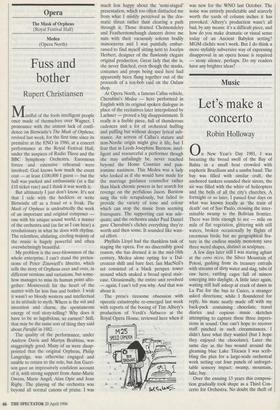Op e ra The Mask of Orpheus (Royal Festival Hall) Medea (Opera
North)
Fuss and bother
Rupert Christiansen
Mindful of the fools intelligent people once made of themselves over Wagner, I pronounce with the utmost lack of confi- dence on Birtwistle's The Mask of Orpheus, revived last week, for the first time since its premiere at the ENO in 1986, at a concert performance at the Royal Festival Hall, under the auspices of Radio Three and the BBC Symphony Orchestra. Enormous forces and extensive rehearsal were involved; God knows how much the event cost — at least £100,000 I guess — but the hall was packed and enthusiastic (at a flat £10 ticket rate) and I think it was worth it.
But ultimately I just don't know. It's not that I side with the hecklers or write Birtwistle off as a fraud or a freak. The Mask of Orpheus is undoubtedly the work of an important and original composer one with his unique sound world, a master of the orchestra and (as far as I can hear) a revolutionary in what he does with rhythm. The relentless, ululating, circling majesty of the music is hugely powerful and often overwhelmingly beautiful.
My problem is the over-blownness of the whole enterprise. I can't stand the preten- sions of Peter Zinovieff's libretto, which tells the story of Orpheus over and over, in different versions and variations, but some- how manages to miss its human point alto- gether: Monteverdi hit the heart of the matter with far less fuss and bother. I wish it wasn't so bloody western and intellectual in its attitude to myth. Where is the wit and invention and charm, the spontaneous energy of real story-telling? Why does it have to be so lugubrious, so earnest? Still, that may be the same sort of thing they said about Parsifal in 1882.
The quality of the performance, under Andrew Davis and Martyn Brabbins, was staggeringly good. Many of us were disap- pointed that the original Orpheus, Philip Langridge, was otherwise engaged and unable to return to the role, but Jon Garri- son gave an impressively confident account of it, with strong support from Anne-Marie Owens, Marie Angel, Alan Opie and Jean Rigby. The playing of the orchestra was beyond all normal canons of praise. I was much less happy about the 'semi-staged' presentation, which too often distracted me from what I mistily perceived as the dra- matic thrust rather than clearing a path through it. Those dratted Cholmondeley and Featherstonehaugh dancers drove me nuts with their vacuously solemn bodily manoeuvres and I was painfully embar- rassed to find myself sitting next to Jocelyn Herbert, designer of the flawlessly elegant original production. Great lady that she is, she never flinched, even though the masks, costumes and props being used here had apparently been flung together out of the proceeds of a ten-bob raid on the Oxfam shop.
At Opera North, a famous Callas vehicle, Cherubini's Medea — here performed in English with its original spoken dialogue in place of the recitatives later interpolated by Lachner — proved a big disappointment. It really is a feeble piece, full of thunderous cadences and a lot of orchestral huffing and puffing but without deeper lyrical sub- stance. An actress of Callas's stature and non-Nordic origin might give it life, but I fear that in Leeds Josephine Barstow, intel- ligent and resourceful a performer though she may unfailingly be, never reached beyond the Home Counties and pan- tomime nastiness. This Medea was a lady who looked as if she would have made for the marriage guidance counsellor rather than black chtonic powers in her search for revenge on the perfidious Jason. Barstow sang the role scrupulously, but failed to provide the variety of tone and colour which can stop the music from seeming foursquare. The supporting cast was ade- quate; and the orchestra under Paul Daniel gave Cherubini's clichés everything they're worth and then some. It sounded like wast- ed effort.
Phyllida Lloyd had the thankless task of staging the opera. For no discernibly good reason, she has dressed it in the mid-18th century, Medea alone opting for a Dal- crozean shift and bare feet. Ian MacNeil's set consisted of a black perspex tower around which snaked a broad spiral stair- case. Occasionally, the entire unit revolved — again, I can't tell you why. And that was about it.
The press's tiresome obsession with operatic catastrophe re-emerged last week with reports of the booing of Tim Albery's production of Verdi's Nabucco at the Royal Opera House, reviewed here when it was new for the WNO last October. The noise was entirely predictable and scarcely worth the yards of column inches it has provoked. Albery's production wasn't all bad, by any means: it's a difficult piece, and how do you make dramatic or visual sense today of an Ancient Babylon setting? MGM clichés won't work. But I do think a more stylishly subversive way of expressing disapproval in an opera house is required — stony silence, perhaps. Do my readers have any brighter ideas?


































































 Previous page
Previous page